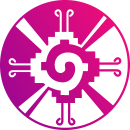-
Faith
(feyth)
The supreme assertion of human thought, the only requirement for eternal salvation.
-
Faithfuls of Days
(feyth' fuhlz uv deyz')
A group comprising the Stationary Sons of the Trinity.
-
Fandors
(fan' dohrs)
Large birds trained to carry human passengers, became extinct approximately 30,000 years ago.
-
Fanoving
(fan' oh ving)
A local universe neighbor of Nebadon.
-
Fantad
(fahn' tahd)
Spiritual leader of green race.
-
Fatalism
(feyt' l iz uhm)
A blind and passive belief system.
-
Father-Absolute
(fah' ther ab' suh loot)
The creator of the central and perfect universe and the Father of all other Creators.
-
Father-Brahma
(fah' ther brah' muh)
In the Trimurti, the supreme trinity of Hinduism, Brahma, the first member, is conceived as being self-created out of the Brahman — infinity.
-
Father fragment
(fah' ther frag' muhnt)
The gift of the absolute God to those creatures whose destiny encompasses the possibility of the attainment of God as absolute.
-
Father-fused
(fah' ther fyoozd)
Fusion with an Adjuster or other such fragment .
-
Father-fused Mortals
(fah' ther fyoozd mawr' tlz)
A group comprising the Ascending Sons of God.
-
Father Melchizedeks
(fah' ther mel kiz' i dek)
A descending order of dual-origin beings, those of origin in any two of the Paradise Deities or otherwise created by any two beings of direct or indirect descent from the Paradise Deities.
-
Fatherhead
(fah' ther hed)
Jesus' use of the earth family as an illustration of divine relationship .
-
Femaleness
(fee' meyl nes)
A complement of maleness.
-
Finaliter
(fahy nal' i tur)
Members of the Mortal Finaliter Corps. The corps consists primarily of beings who are Father-fused and also includes Havona natives and Gravity Messengers. Ascendant mortals become a part of this corps.
-
Finalities
(fahy nal' i teez)
Difficult for relative beings to comprehend, be they existential or experiential; therefore must they always be presented as relativities.
-
Finite
(fahy' nahyt)
The finite level of reality is characterized by creature life and time-space limitations. Finite realities may not have endings, but they always have beginnings — they are created.
-
Finite cosmos
(fahy' nahyt koz' muhs)
The realm of the Supreme, whose reality becomes increasingly apparent as the universes attain to the maximum level of Trinity identification.
-
First Source and Center
(furst sohrs and sen' ter)
Of all the names by which God the Father is known throughout the universes, those which designate him as the First Source and the Universe Center are most often encountered.
-
Flavius
(flay' vee us)
Greek Jew of Jerusalem whom Jesus visited.
-
Fonta
(fon' tah)
The first female human being, whose initial expression of human will choice occurred when she was ten years old, in 991,474 B.C. Died during an earthquake 32 years later (see Andon).
-
Force
(fawrs)
In discussing physical-energy manifestations, we generally use the terms cosmic force, emergent energy, and universe power.
-
Force-charge
(fawrs chahrj)
The primordial force-charge of space is sometimes called pure energy or segregata.
-
Force-focal
(fawrs foh' kuhl)
The Paradise focal point of its specialized power control and segmental energy distribution.
-
Force-space
(fawrs speys)
The potential inherent in the functional totality of the Unqualified Absolute.
